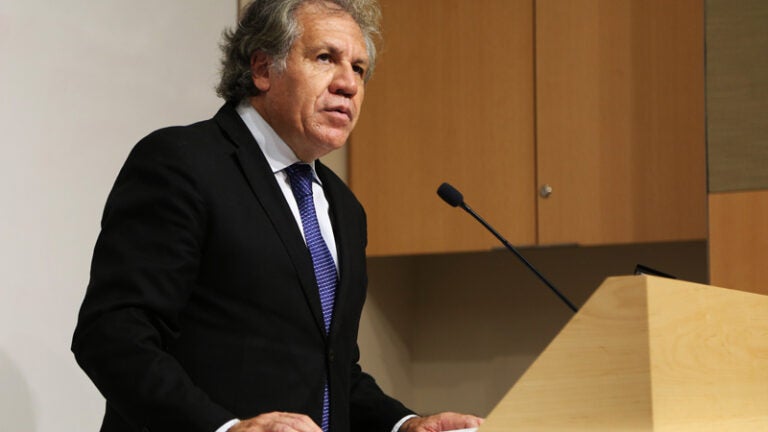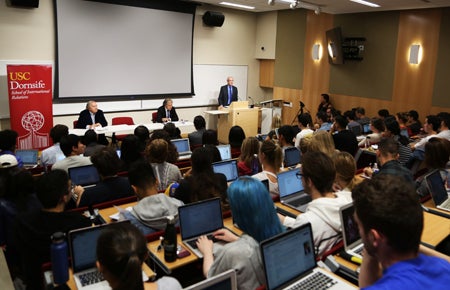
Head of the Organization of American States discusses Latin American democracy
“In the Americas we have created a community of states that is grounded in the shared values of democracy, universal freedoms, human rights and the rule of law. These ideas are inextricably intertwined,” said Luis Almagro, secretary general of the Organization of American States, speaking to a standing-room only auditorium of USC students.
The Organization of American States supports democracy, human rights, security and prosperity among its 35 member states in North and South America and the Caribbean. Almagro was elected its secretary general in March 2015, making “more rights for more people” the central theme of his leadership.
Almagro presented his vision for democracy in the Americas and the current state of justice in Latin America at a Nov. 8 lecture hosted by the USC Dornsife School of International Relations. The event was moderated by Wayne Sandholtz, director of the School of International Relations, and Gerardo Munck, professor of international relations and political science.
“It’s appropriate that Dr. Almagro speak on these themes here in Los Angeles,” said Sandholtz, John A. McCone Chair in International Relations and professor of international relations and law, in his introduction. “We are in fact a microcosm of the [Organization of American States] in Los Angeles. I’m quite certain we have every country of the organization represented in our population.”
Almagro shared his insights on the state of democracy in Latin America, and how the organization is working to achieve peace and justice among its member states.

Wayne Sandholtz, director of the School of International Relations, invites questions for Almagro from the audience.
Almagro on the main tenets of democracy and its biggest challenge:
“The rule of law is a protection of the individual rights of people. Human rights do not exist in societies where the rule of law does not exist and there’s no rule of law in societies where human rights are not protected. In turn, individual citizens must have the full freedom to participate in the decision-making processes that determine the laws that govern them. It is through universal suffrage that citizens are guaranteed the rights and the possibility at the very heart of democracy. Each idea is dependent on the other. The worst impediment to development and democracy is inequality. And the worst inequality is that which results from the failure to protect rights.”
On the Organization of American States’ commitment to uphold democracy in the Americas and the Inter-American Democratic Charter, which outlines the authority and responsibility of the organization to act in situations where there is a threat to democracy in member states:
“…the people of the Americas have the right to democracy and their governments have an obligation to promote and defend it. Those elected to lead assume the responsibility to protect these rights. If they do not, they lose the legitimacy to lead. The Democratic Charter defines the essential elements of representative democracy as a respect for human rights, fundamental freedoms, rule of law, periodic free and fair elections based on a universal suffrage, a pluralistic system of political parties as well as a separation of power and a dependence of branches of government. Democracy was clearly defined as well as the situations where member states might cooperate and support each other.”
On the role the organization has played in working to uphold democracy in Venezuela, where tensions are mounting as many see the government moving toward a dictatorship:
“Over the past few years we have witnessed democratic institutions in Venezuela, its rule of law and semblance of … government all dismantled piece by piece. The tragedy that has unfolded is a clear example of the cost of when democracy fails.
“In June 2016, I executed my responsibility as secretary general by invoking Article 20 of the Democratic Charter. In a comprehensive report, I have detailed the humanitarian, social, economic and democratic collapse in the country. …
“… The tragedy [in Venezuela] is not only a warning for the entire hemisphere that degradation of democracy represents a threat to peace and security in the entire hemisphere. Insecurity created by the complete elimination by the rule of law not only creates instability and violence within Venezuela borders, but it allows organized crime to grow unchecked, in some cases aided by the regime, resulting in criminal activities throughout the region.”
On the challenges he sees going forward in Latin America:
“I think the most serious crisis that we are facing is about immigration. These problems reduce the life expectancy of our citizens in the Americas, so these are the priority. … The causes of immigration are very serious, too. Narcotrafficking, violence, organized crime are issues that need to be addressed in the continent. Corruption is the worst … disease that democracy has in the continent. If we don’t raise the standards in order to investigate and to judge corruption then our democracies will face a lot of trouble in the future.”